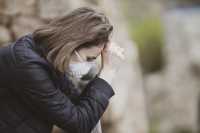
14 Oct Pandemic Anxiety May Be Causing Teeth Grinding Rates To Increase
Around 8% of the population in America experiences sleep bruxism – a disorder characterized by teeth grinding and jaw clenching that leads to headaches, the wearing  down of teeth, and jaw pain – to mention just a few effects. A new market research report called COVID-19 Impact on Sleeping Bruxism Treatment Market Overview and Forecast 2020 to 2026 has found that the current health crisis has led to a spike in bruxism. The report forecasts a big rise in the need for treatment of the effects of bruxism owing to currently high levels of stress across the globe.
down of teeth, and jaw pain – to mention just a few effects. A new market research report called COVID-19 Impact on Sleeping Bruxism Treatment Market Overview and Forecast 2020 to 2026 has found that the current health crisis has led to a spike in bruxism. The report forecasts a big rise in the need for treatment of the effects of bruxism owing to currently high levels of stress across the globe.
Why Is Bruxism On The Rise?
It is a stressful time in many ways, and this increases the likelihood of teeth grinding and jaw clenching at night. A study published in the journal Head & Face Medicine showed that nightly gnashing of teeth was especially prevalent among those who tried to cope with stress by escaping from difficult situations. Bruxism can lead to everything from tooth sensitivity to pain in the muscles of the jaw responsible for chewing. While there are many exercises to soothe tight jaw muscles, this is just one approach that should be considered. Because bruxism can actually lead to tooth loss, it should be taken seriously, and if stress is the cause, then this separate issue should also be tackled proactively.
Do You Grind Your Teeth At Night?
Bruxism can be noisy, so if you have a partner who mentions you have this habit at night, see a doctor for due diagnosis and treatment. If nobody has told you that you grind your teeth and you have symptoms such as frequent headaches upon waking up or tightness in the jaw, then know that there are easy ways that you can discover whether or not you grind your teeth. The key to accurate assessment is an easy-to-use electrode set that takes polysomnography recordings that provide a clear picture of what is going on when you are asleep.
Lowering Stress Levels
If your doctor determines that your bruxism is caused by stress, know that there are many completely natural yet powerful ways to lower stress hormone levels. These include yoga, Tai Chi, and mindfulness meditation. Simple physical activity is also useful, as are a plethora of therapies – including art, musical, and animal assisted therapy. Even spending time in nature is useful, with studies showing that spending just 10 minutes in a green area such as a park or forest can significantly reduce levels of stress hormone, cortisol.
Bruxism is on the rise in the U.S. and other countries, owing in no small part to current stressful circumstances. Bruxism has serious consequences – including the wearing down of teeth, tooth loss and sensitivity, and jaw pain. Those who have symptoms of bruxism should visit their doctor to ensure they receive due diagnosis and treatment. They may be asked to wear an electrode set during sleep to determine the extent of the problem.
Last Updated on October 14, 2020 by Marie Benz MD FAAD
